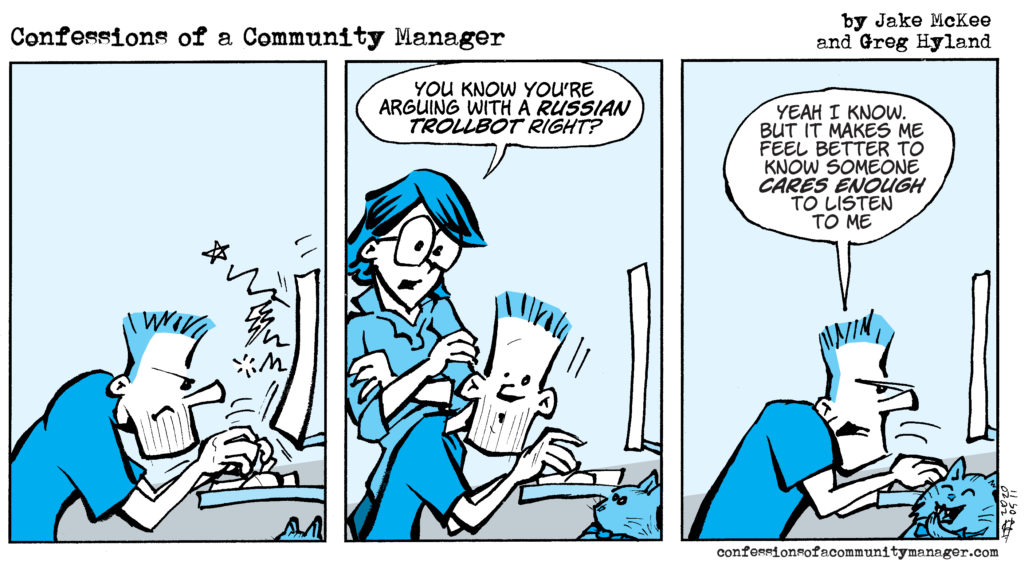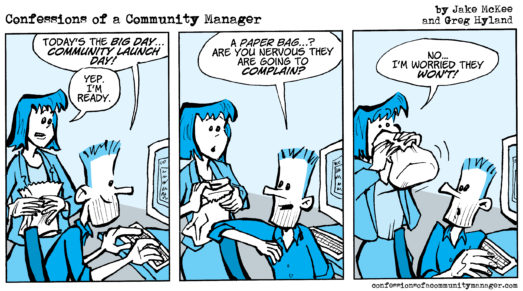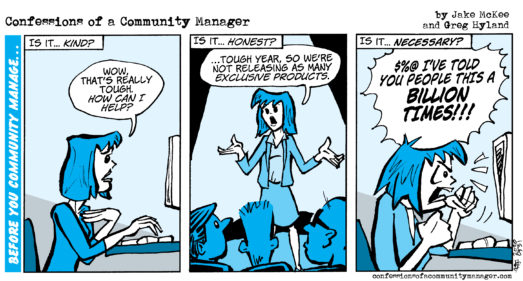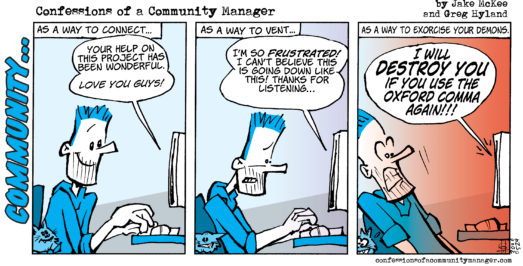Arguing with Trollbots
Sometimes we just need to feel heard.
The strangest thing in today’s modern world is that while it’s never been easier to communicate given the access to tools and channels, the ability to actually communicate with others is getting harder and harder. Just look at a Facebook or Twitter comment stream and it’s fascinating to see how easily a seemingly simple conversation between two people who absolutely agree with each other can get instantly off the rails. This dynamic makes us feel further apart from each other than ever before. And sometimes a trollbot who knows just what to say is a warmer, friendlier voice than our own real life friends and contacts.
Since this issue is well traveled ground, I won’t spend a lot of time rehashing what most of us already understand and experience. But what I do want to say is that it doesn’t have to be this way… we absolutely can improve our online communication. But it has to be intentional and we have to slow down in how we are crafting messages, and even in how we are reading messages.
At the start of the pandemic, my daughter’s middle school staff was sending a TON of communications, each from a different member of the staff. Teachers were sending individual and unique emails, the school staff was sending their standard, multiple weekly email updates, and the district had their own emails too. It was an absolute flood. Each one was a mess of fonts and data and style and content and confusion. I needed clarity, cohesion, and simplicity… a message that I politely relayed to the school. To their credit, they simplified and started sending out fewer and simpler messages after that, which really helped.
During this time, my daughter’s summer camp, Camp Champions (an amazing summer camp my daughter has been going to for 6 years) was beginning to send out emails about the status of camp and whether it was going to be happening this summer. I was struck by how easy and fun the emails were. They were frank, simple, and to the point. When they didn’t know what was happening, they said so. When they thought we should be doing something specific, they boldly told us straight out. And every mail had their trademark Camp Champions flair.
So being the community guy I am, I had to get Steve Sir (they call everyone “sir” and “ma’am” at Camp Champions), the owner and operator of Camp Champions to tell me how they make such great email communication magic. Below is my interview with him.
(HUGE thanks to him taking a few minutes out of his extremely busy schedule to answer my questions!!)
Steve Sir, how do you introduce yourself at parties?
It depends on the situation:
- President of the “Married Over My Head” Club
- An educator
- A Camp Geek
I’ve been really impressed with the way you and the Camp Champions team have communicated through the pandemic. It’s a wonderful balance of depth and simplicity. I have to imagine you have a “philosophy” about how you communicate in the difficult medium of text as you write up these email blasts.
My main philosophy is fairly simple:
- respect the reader’s intelligence,
- be honest and transparent,
- remember the reader has other important things going on, so . . .
- . . . be as clear and pleasant (and amusing if appropriate) as possible.
Here are some thoughts on the process itself. We start with a couple of primary assumptions.
- Every reader has a different appetite for information. I learned this message the hard way about 10-13 years ago at camp. We have morning meetings among our leadership team and I was hearing a consistent complaint about “communication”. I tried a bevy of different techniques to improve our “communication” until I finally broke down and asked about a dozen people separately what they did not like. Each person had a completely different answer. Some found the meetings too long, too detailed and boring. Others felt a need for more information and even felt like critical details were being withheld. It was then that it occured to me – this generation had grown up with Google. When I was in high school, college and my first jobs; I got the content that the teacher or boss wanted me to get, when they wanted me to get it, presented in the way they wanted and at the time they wanted. Young people today (including our camp parents) now approach information in a post-Google world where you get what YOU want, when you want it in the amount that you desire. With that as a baseline, you know that anything you write is simultaneously too detailed . . . and too short. With that in mind, we strive to provide clear overviews with opportunities for deeper dives for those who want more detail.
- I ask “what do I want my reader to learn or to feel”?
- With the desired outcome clearly in mind, I make a quick outline of major points (noting which ones we will want to flush out for our “give me more information” parents).
- I write a first draft in one sitting without any self-critique.
- I will ask at least two people (Susie Ma’am and Erec Sir are among the best) edit the draft for clarity and effectiveness.
- I will give it one last read to make sure that it still hangs together.
I know this sounds like an elaborate process, but we can turn a letter or blog around in less than an hour when we need to.
The tone of all your content really matches your own personality and the culture of the Camp Champions experience. How do you create content in text that matches the culture of the in-person experience so well?
I already mentioned being honest and transparent. I think I would add “be vulnerable” to that list. We think of ourselves as partners with our families, not professors. We do not have all the answers. We are often off-base. But I want people to know that we truly care about their children and about what we do. WIth this in mind, we strive to find the best answers we can. When we are wrong, we are excited to learn something new.
When I wrote our blogs about traveling with our kids, I wanted people to see that we were often confused, frustrated or uncertain in foreign lands. And when we made fools of ourselves, we shared the tales. I have a certain distaste for the “Holiday Letter” that makes the family seem idealized. I want people to smile and think, “Susie Ma’am and Steve Sir are like us. They want what is best for their family, they do not pretend to have the answers, but they will strive to improve while finding joy.”
If a business is trying to figure out how to communicate effectively to their customers, during or after an event like this pandemic, what are your tips for how to develop great communications? How do you make your communications (online, offline, or anything else) really sing? (And knowing you, please don’t actually sing your answer)
Especially with something like the pandemic, you must suspend judgment. We live in a highly polarized world where the smallest gestures can become political statements. Do you wear a mask? What types of errands are OK? What businesses should open? I think it is a fool’s errand to wade into these waters.
Instead, I think you share what you learn. Do some great research, write it clearly (both in summary and in detail) and share it. Stick with facts.
I also found it very helpful to share my own uncertainties with readers. We (erroneously) place a great premium on the idea of decisiveness. I often hear strong opinions that seem to be built on foundations of bad assumptions or uncertainty. My mother was the wisest person I have even known. She was also the quickest to say, “I don’t know.” In a time like today – when everything that we KNEW to be true 2-3 months ago has turned on its head – how can you claim certainty or decisiveness? Instead, I like to suggest that the reader and I are both on a journey to find the best answers we can – knowing there is no right answer.
And finally, realize that people can see the exact same information that you see and come to a different conclusion. The difference may be from a different process of thought or a different emotional reaction. But they are not Wrong, nor Right, but they are finding the right answers for themselves. When we gain more certainty, I hope we will have congruence on what the best answers are, but I want to give people lots of room to feel OK about their decisions in these chaotic times.
Thanks, Steve Sir!



